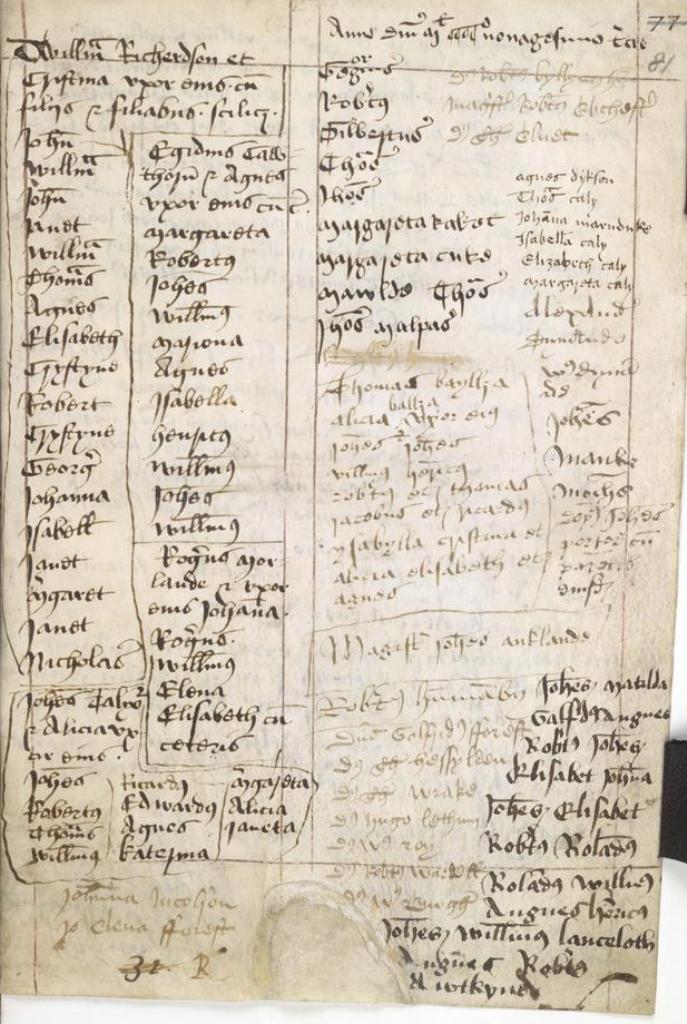English Corner
"The Kissinger Cables are part of today's launch of the WikiLeaks Public Library of US Diplomacy (PlusD), which holds the world's largest searchable collection of United States confidential, or formerly confidential, diplomatic communications. As of its launch on April 8, 2013 it holds 2 million records comprising approximately 1 billion words."
https://search.wikileaks.org/plusd/pressrelease/
Via
http://www.heise.de/newsticker/meldung/Oeffentliche-Bibliothek-der-US-Diplomatie-Wikileaks-startet-Projekt-K-wie-Kissinger-1836823.html
https://search.wikileaks.org/plusd/pressrelease/
Via
http://www.heise.de/newsticker/meldung/Oeffentliche-Bibliothek-der-US-Diplomatie-Wikileaks-startet-Projekt-K-wie-Kissinger-1836823.html
KlausGraf - am Montag, 8. April 2013, 17:43 - Rubrik: English Corner
noch kein Kommentar - Kommentar verfassen
By Jennifer K. Nelson:
http://archivalia.tumblr.com/post/47115225569/german-paleography-resources-compiled-list
http://archivalia.tumblr.com/post/47115225569/german-paleography-resources-compiled-list
KlausGraf - am Donnerstag, 4. April 2013, 18:35 - Rubrik: English Corner
noch kein Kommentar - Kommentar verfassen
http://www.wilsoncenter.org/article/extensive-collection-declassified-materials-now-accessible-searchable-new-digital-archive
"The Wilson Center today launched a new Digital Archive of declassified official documents from nearly 100 different archives in dozens of different countries that provide fresh, unprecedented insights into the history of international relations and diplomacy."
http://www.digitalarchive.org/
Documents in English translation, no facsimiles.
"The Wilson Center today launched a new Digital Archive of declassified official documents from nearly 100 different archives in dozens of different countries that provide fresh, unprecedented insights into the history of international relations and diplomacy."
http://www.digitalarchive.org/
Documents in English translation, no facsimiles.
KlausGraf - am Dienstag, 2. April 2013, 22:35 - Rubrik: English Corner
noch kein Kommentar - Kommentar verfassen
https://itunes.apple.com/en/app/sindone-2.0/id614248391?mt=8
http://torino.repubblica.it/cronaca/2013/03/28/news/nell_era_della_tecnologia_ecco_la_sindone_2_0-55514783/
See also
http://books.google.de/books?id=pcvWAAAAMAAJ&lpg=PA79
http://torino.repubblica.it/cronaca/2013/03/28/news/nell_era_della_tecnologia_ecco_la_sindone_2_0-55514783/
See also
http://books.google.de/books?id=pcvWAAAAMAAJ&lpg=PA79
KlausGraf - am Sonntag, 31. März 2013, 18:29 - Rubrik: English Corner
noch kein Kommentar - Kommentar verfassen

Friday Flowers 3/15/13 by Sonny Carter is licensed under a Creative Commons Attribution-NonCommercial-NoDerivs 3.0 Unported License.
Each week on friday Sonny Carter ist posting a flower picture in the Archives list. This is nice but it is exciting that a Creative Commons license allows me to re-post the pictures in my non-commercial Tumblr blog.More pictures tagged naturalia in Archivalia_EN:
http://archivalia.tumblr.com/tagged/naturalia
KlausGraf - am Samstag, 23. März 2013, 22:07 - Rubrik: English Corner
noch kein Kommentar - Kommentar verfassen
http://www.ilab.org/eng/documentation/1048-the_girolamini_thefts_-_marino_massimo_de_caro_sentenced_to_7_years_imprisonment.html
"In April 2012 it was announced that 1500 books were missing from one of the richest and oldest libraries in Italy: the Girolamini Library in Naples. Shortly afterwards the library’s director Marino Massimo de Caro was suspended, then arrested and accused of embezzlement along with four accomplices from Argentina and Ukraine.
Now, Napoli Today reports that Marino Massimo De Caro was sentenced to 7 years imprisonment and lifetime exclusion from public office following an expedited trial for the embezzlement of hundreds of volumes from the Girolamini Library. The other defendants received shorter sentences"
http://archiv.twoday.net/search?q=girolamini
"In April 2012 it was announced that 1500 books were missing from one of the richest and oldest libraries in Italy: the Girolamini Library in Naples. Shortly afterwards the library’s director Marino Massimo de Caro was suspended, then arrested and accused of embezzlement along with four accomplices from Argentina and Ukraine.
Now, Napoli Today reports that Marino Massimo De Caro was sentenced to 7 years imprisonment and lifetime exclusion from public office following an expedited trial for the embezzlement of hundreds of volumes from the Girolamini Library. The other defendants received shorter sentences"
http://archiv.twoday.net/search?q=girolamini
KlausGraf - am Montag, 18. März 2013, 20:02 - Rubrik: English Corner
noch kein Kommentar - Kommentar verfassen
"As a general rule, most medieval manuscripts are the product of a single scribal campaign. There are of course exceptions, most notably books such as chronicles and cartularies which were sometimes added to over many generations. But the Durham Liber Vitae (Book of Life) is perhaps exceptional in having been updated over a period of some 700 years, from the 1st half of the 9th century to shortly before the dissolution of Durham Cathedral Priory in the 16th century."
http://britishlibrary.typepad.co.uk/digitisedmanuscripts/2013/03/the-durham-book-of-life-online.html

http://britishlibrary.typepad.co.uk/digitisedmanuscripts/2013/03/the-durham-book-of-life-online.html
KlausGraf - am Montag, 18. März 2013, 15:31 - Rubrik: English Corner
noch kein Kommentar - Kommentar verfassen
http://techcrunch.com/2013/03/08/inside-google-street-view-from-larry-pages-car-to-the-depths-of-the-grand-canyon/
On Google Streetview see here
http://archiv.twoday.net/search?q=streetview
On Google Streetview see here
http://archiv.twoday.net/search?q=streetview
KlausGraf - am Sonntag, 10. März 2013, 19:00 - Rubrik: English Corner
noch kein Kommentar - Kommentar verfassen
http://www.huffingtonpost.com/2013/03/05/iraq-national-library-destruction_n_2813825.html?utm_hp_ref=tw
"In the second issue of the magazine Document Journal, art historian Zainab Bahrani gives a first-hand account of the destruction of the National Library and State Archives of Iraq, an institution that collected thousands of historical documents, legal papers, manuscripts, clay tablets. "
http://documentjournal.com/no-50-amnesia-in-mesopotamia/
"In the second issue of the magazine Document Journal, art historian Zainab Bahrani gives a first-hand account of the destruction of the National Library and State Archives of Iraq, an institution that collected thousands of historical documents, legal papers, manuscripts, clay tablets. "
http://documentjournal.com/no-50-amnesia-in-mesopotamia/
KlausGraf - am Freitag, 8. März 2013, 15:24 - Rubrik: English Corner
noch kein Kommentar - Kommentar verfassen
http://liber.library.uu.nl/index.php/lq/article/view/8089
Libraries often are the only source for public domain material such as unique manuscripts. This position puts them in power when determining the conditions under which reproductions can be delivered. This position is prone to change as soon as public domain material is available via internet and thus can be copied by anyone.
We can observe a variety in re-use policies among cultural heritage institutions, in which not only libraries but also archives and museums are involved. And there certainly is no unanimity when it comes to commercial re-use. The situation becomes even more complicated when public-private partnerships are involved in which the commercial party poses restrictions on access and/or re-use.The paper analyses the legal issues that are at stake in deciding about the library’s re-use policy of digitised heritage material within the public domain. It also gives an overview of arguments pro and con open access without any restrictions. Its conclusion is in favour of no limitations for re-use, commercial or not.
Libraries often are the only source for public domain material such as unique manuscripts. This position puts them in power when determining the conditions under which reproductions can be delivered. This position is prone to change as soon as public domain material is available via internet and thus can be copied by anyone.
We can observe a variety in re-use policies among cultural heritage institutions, in which not only libraries but also archives and museums are involved. And there certainly is no unanimity when it comes to commercial re-use. The situation becomes even more complicated when public-private partnerships are involved in which the commercial party poses restrictions on access and/or re-use.The paper analyses the legal issues that are at stake in deciding about the library’s re-use policy of digitised heritage material within the public domain. It also gives an overview of arguments pro and con open access without any restrictions. Its conclusion is in favour of no limitations for re-use, commercial or not.
KlausGraf - am Donnerstag, 7. März 2013, 18:07 - Rubrik: English Corner
noch kein Kommentar - Kommentar verfassen